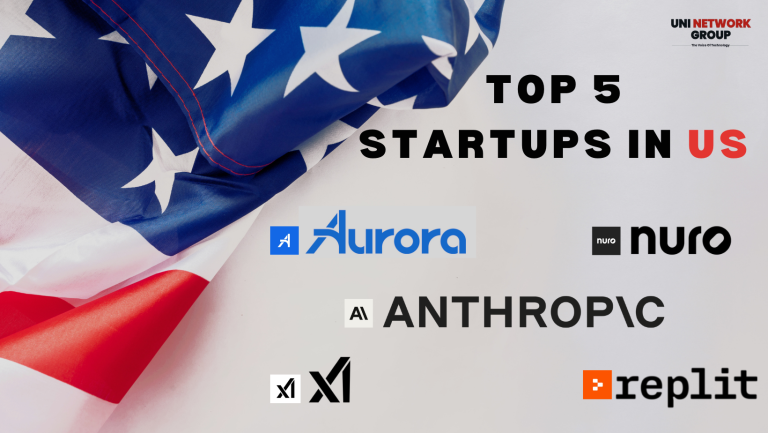Top 5 Startups in the USA in 2025 – Collaborations and Partnerships Fuelling Innovation
In a landscape characterized by exponential technological growth and paradigm-shifting innovation, the United States has once again emerged as the epicentre for pioneering entrepreneurial ventures in 2025. Amid this dynamic environment, strategic alliances and cross-sector collaborations have proven to be pivotal in accelerating startup trajectories. This report offers a critical analysis of five of the year’s most prominent startups—Anthropic, xAI, Aurora, Nuro, and Replit—focusing on the synergistic partnerships that underpin their innovations, operational scalability, and financial ascendancy. These collaborations serve not only as catalysts for growth but as safeguards ensuring ethical practices, regulatory alignment, and cross-border knowledge exchange.
Why we chose these Startups?
Anthropic, xAI, Aurora, Nuro, and Replit were chosen because they are redefining their respective industries—AI, autonomous mobility, and software development—through groundbreaking innovation and impactful partnerships. Each startup has demonstrated exceptional growth in 2025, both in valuation and user adoption, while actively collaborating with major industry players like Amazon, Tesla, FedEx, Nvidia, and OpenAI. Their strategic alliances not only accelerate technological advancement but also position them as key drivers of the future digital economy.
- Anthropic: Advancing Responsible AI Through Strategic Integration
Anthropic is a top AI company valued at over $65 billion after raising over $11.5 billion. It has received most of these funds from Amazon, which provides it with its data centre infrastructure. Anthropic has also raised funds from Google, Lightspeed Venture Partners, and Menlo Ventures. The company has built Claude, a ChatGPT rival it hopes will be a better competitor to ChatGPT and other models. 
Anthropic has entrenched itself as a premier force in the artificial intelligence domain, largely due to the innovative capabilities of Claude, its conversational AI platform. As of 2025, the company has achieved a staggering valuation of $65 billion, bolstered by cumulative funding of over $11.5 billion. Amazon’s $4 billion investment extended beyond mere financial backing, providing robust infrastructure via AWS for model training and deployment.
Concurrently, Google’s partnership has enhanced Claude’s contextual awareness and algorithmic safety, resulting in a substantial increase in model reliability and interpretability. Anthropic’s enterprise strategy has cantered on integrating Claude into leading platforms such as Salesforce, Slack, and Notion. These integrations contributed to a 42% year-over-year uptick in enterprise adoption and a meteoric rise in monthly active users—from 3 million to 13 million, representing a 330% surge. More than 150 Fortune 500 companies have now deployed or piloted Claude, underscoring the product’s utility and market relevance.
Additionally, Claude 3’s multilingual capability—made possible through a linguistic partnership with Duolingo—has expanded its reach into non-English-speaking markets, boosting global user acquisition by 38%. Partnerships with OpenAI governance groups and Stanford’s Human-Cantered AI Lab further ensure that Anthropic remains at the forefront of ethical and responsible AI practices. This dual focus on scale and responsibility situates Anthropic as a vanguard of next-generation AI and positions it to shape public policy and educational curriculums.
- xAI: Integrative AI Ecosystems Through Multimodal Synergies
Founded by Elon Musk in 2023, xAI has rapidly ascended as a transformative entity in the artificial intelligence sector, commanding a valuation exceeding $50 billion by 2025. Central to its portfolio is Grok, a real-time, adaptive conversational agent that gained significant traction following xAI’s acquisition of X (formerly Twitter). This strategic consolidation formed xAI Holdings, a conglomerate now valued at approximately $113 billion.
Grok engages over 18 million users, sustaining a retention rate of 78% due to its personalized interaction framework and integration with live social media streams. Following its merger with X, xAI reported a 60% increase in daily user sessions, highlighting the efficacy of data-rich conversational learning. Grok’s interactive knowledge base now updates at a rate of over 5 million data points per hour, making it one of the most adaptive AI agents globally.
The firm’s cross-industry partnerships fortify its multi-dimensional strategy. Collaborations with Tesla have introduced Grok into in-vehicle systems, enhancing automotive AI experiences. Simultaneously, partnerships with Neuralink aim to pioneer neuro-linguistic computational models, bridging artificial intelligence and neural sciences. xAI has also entered into a strategic partnership with MIT’s Centre for Brains, Minds & Machines to co-develop cognitive AI applications for learning disabilities and advanced tutoring systems.
Academically, xAI remains a key stakeholder in AI governance dialogues, engaging with research think tanks and global policy bodies. Its diversified approach—merging entertainment, mobility, and neurotechnology—establishes it as a formidable contender in the post-generative AI era and reinforces its vision of building an interconnected AI ecosystem.
- Aurora: Reimagining Freight Dynamics via Autonomous Synergy
Aurora has distinguished itself as a disruptive force in the logistics and freight industry, specialising in autonomous vehicle technology. With cumulative funding of $4.2 billion, Aurora has orchestrated impactful partnerships with FedEx, Uber Freight, Toyota, Walmart, and Kroger. These alliances have allowed Aurora to expand both its B2B and B2C delivery networks across urban and rural markets.
Notably, its collaboration with FedEx has enabled autonomous transport operations covering more than 400,000 miles, significantly improving delivery efficiency while reducing emissions by 21%. Integration with Toyota’s autonomous fleet has resulted in the deployment of over 800 autonomous trucks across U.S. highways. From 2023 to 2025, pilot deployments surged by 320%, and last-mile delivery operations—powered by partnerships with Walmart and Kroger—expanded into 10 states.
Aurora’s operational database now exceeds 1.2 million logged driving hours, reinforcing its machine learning systems and facilitating predictive analytics. Its proprietary AI navigation engine—developed in collaboration with Carnegie Mellon—now reduces route planning errors by 46%. The firm projects entry into a $9 billion addressable market by 2027 and is expected to reach profitability by Q3 2026.
Aurora’s continued investment in academic collaborations, such as its ongoing work with Stanford’s AI and Robotics Lab, ensures that the company not only leads in deployment but also shapes the underlying science of autonomous systems. Through strategic alignment across sectors—ranging from logistics and retail to automotive hardware—Aurora has transitioned from a high-risk tech venture to a commercial cornerstone in autonomous freight management.
- Nuro: Urban Mobility Reengineered Through Autonomous Robotics
Nuro has emerged as a frontrunner in autonomous delivery, specializing in last-mile urban logistics. With $2.1 billion in venture funding, the company has pivoted toward a licensing model that services more than six global automakers, including Hyundai and General Motors. This shift has catalysed a 90% revenue increase in its licensing division over just two fiscal quarters.
Operationally, Nuro facilitated over 2.5 million deliveries in 2024—a 5x increase compared to 2023—across verticals such as pharmaceuticals, groceries, and retail. Collaborations with Nvidia have augmented its computational capabilities, while a strategic alliance with Waymo has optimized its perception systems, improving obstacle detection and route accuracy by 34%.
Academically, Nuro’s joint research with MIT’s Robotics Lab has yielded innovations in energy efficiency, reducing per-delivery power consumption by 28%. A new partnership with the University of Michigan focuses on urban planning and AI traffic simulations, which could cut urban congestion by 17% in deployment zones. With active deployments in over 15 U.S. cities and plans to enter European markets by late 2025, Nuro is poised to capture a dominant position in the projected $50 billion autonomous delivery market by 2030.
Its fusion of commercial pragmatism and research-driven strategy renders Nuro not only a technological innovator but also a thought leader in sustainable urban mobility.
- Replit: Democratizing Software Development Through Strategic Interconnectivity
Replit, a cloud-based integrated development environment, has grown into an indispensable tool for developers and learners alike. As of 2025, it hosts over 22 million active users and has sustained a 130% annual growth rate. Its platform success is attributable in large part to partnerships with OpenAI, GitHub, Google Cloud, and Nvidia, which provide a robust backend for both education and enterprise deployment.
Ghostwriter, Replit’s AI-assisted coding tool, was co-developed with OpenAI and now supports over 5 million weekly users. Seamlessly integrated into Replit’s browser-native IDE, Ghostwriter provides real-time debugging, documentation generation, and code optimization. Usage metrics indicate that 67% of users complete coding projects 2x faster with Ghostwriter assistance.
Replit’s educational partnerships with Khan Academy and Coursera have embedded its platform into 75% of U.S. undergraduate computer science programs. Students launched over 9.2 million applications on Replit in Q1 2025 alone, demonstrating the platform’s unparalleled reach. A recent partnership with Google Cloud now enables cloud-native deployment from within the IDE, empowering users to take projects from prototype to production with minimal friction.
Collaborations with Nvidia have democratized access to machine learning experimentation by enabling direct deployment and testing of models within Replit. A new partnership with Unity is set to integrate game development functionalities by Q4 2025. Through strategic integration of educational and technical tools, Replit is shaping the future of accessible, AI-driven software development.
Conclusion
These five startups—Anthropic, xAI, Aurora, Nuro, and Replit—exemplify the transformative power of cross-sector collaboration in the startup ecosystem. Their strategic partnerships span domains from cloud infrastructure and autonomous hardware to neurotechnology and developer education. Together, these alliances are not merely transactional but catalytic, driving forward innovation, scalability, and sustainable growth in a competitive global landscape. As the U.S. continues to solidify its leadership in AI, mobility, and software democratization, these startups serve as blueprints for success, redefining the architecture of technological entrepreneurship in the modern age.
Sources:
Anthropic | xAi | Aurora | Nuro | Replit | Amazon-Anthropic | NY Post | Fedex & Aurora | Medium | Replit


